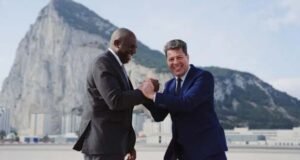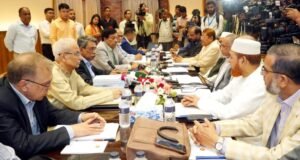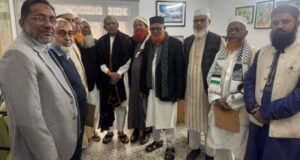 The US and Russia say world powers will meet in New York on Friday to pass a UN resolution endorsing the Syria peace process.
The US and Russia say world powers will meet in New York on Friday to pass a UN resolution endorsing the Syria peace process.
It follows talks in Moscow between US Secretary of State John Kerry, his Russian counterpart Sergei Lavrov and President Vladimir Putin.
Mr Lavrov said both sides would keep working on contentious issues, like the make-up of the opposition delegation.
Mr Kerry said they had reached some agreement, such as on terrorist groups.
Russia launched an air campaign to bolster Mr Assad’s government in September. It says it has targeted only “terrorists”, above all jihadist militants from the Islamic State (IS) group, but activists say its strikes have mainly hit Western-backed rebel groups.
Friday’s meeting in New York would pass a UN resolution reaffirming the principles of the peace process agreed in Vienna last month, Mr Lavrov said.
Mr Kerry travelled to Moscow to try to bridge gaps over ways to end the Syrian conflict.
He told President Putin the two countries had “the ability to make a significant difference”.
The US and Russia disagree on what role Syrian President Bashar al-Assad should play in any transition.
The US wants him to stand down, but Russia says only the Syrian people should decide his fate.
There has been some confusion (to put it mildly) about whether Russia is or isn’t supplying weapons and ammunition to the Free Syrian Army (FSA).
Last week, President Putin said it was – then, a few hours later, his spokesman Dmitry Peskov denied it.
On Monday, the chief of the Russian general staff said Russia was supporting the FSA with arms, ammunition and material help (copying Mr Putin almost word for word). But a few hours later a Kremlin aide denied that Moscow was supplying anything.
I used the Tuesday morning conference call with the Kremlin to try to get some clarity. Alas, I failed. This is what Mr Peskov said: “I have nothing to add to what’s already been said. I have nothing to add and I don’t want to explore this subject.” No harm in trying.
A US-led coalition has been targeting IS positions in Syria since September 2014 and does not co-ordinate its raids with the authorities in Damascus.
“Even when there have been differences between us, we have been able to work effectively on specific issues,” Mr Kerry said before the start of his talks with Mr Lavrov.
“The world benefits when powerful nations can find common ground,” he added.
Mr Kerry has been comparing notes with the Russians on a meeting in Riyadh last week that united elements of the Syrian political and armed opposition.
The United States, which supports the Syrian opposition, wants a negotiated settlement based on the 2012 Geneva Communique, which calls for the formation of a transitional governing body. It says President Bashar al-Assad must go.
Russia, which launched an air campaign against Mr Assad’s opponents in September, also calls for the implementation of the Geneva Communique. But it says Mr Assad’s future is for the Syrian people, and not external powers, to decide.
Most of Syria’s political and armed opposition factions now agree on the need for a managed transition, but they demand that the president leave at the start of it.
Bashar al-Assad says peace talks cannot begin until “terrorism” is eliminated, and that his departure is out of the question before elections are held.
 Weekly Bangla Mirror | Bangla Mirror, Bangladeshi news in UK, bangla mirror news
Weekly Bangla Mirror | Bangla Mirror, Bangladeshi news in UK, bangla mirror news






